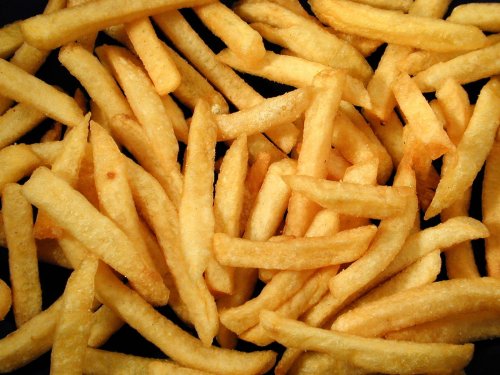Nutrition News Roundup February 2009

Long before it’s talked about on the evening news or Oprah, the most interesting nutritional news and research first appears in peer-reviewed scientific journals; the ones nobody reads but doctors, scientists or grad students. So once a month, AllStarHealth summarizes some of the most promising new findings in our Nutrition News Roundup.
Study: No evidence of acrylamide/breast cancer risk.
“Acrylamide, a probable human carcinogen, is formed during high-temperature cooking of many commonly consumed foods. It is widespread; approximately 30% of calories consumed in the United States are from foods containing acrylamide. In animal studies, acrylamide causes mammary tumors, but it is unknown whether the level of acrylamide in foods affects human breast cancer risk.”
So the authors of this not-yet-published acrylamide study used statistical analysis to investigate the relationship between acrylamide and breast cancer risk. Although acrylamide is abundant in the diet, approximately 30% of calories consumed in the United States are from foods containing acrylamide – “(t)hey found no evidence that acrylamide intake, within the range of US diets, is associated with increased risk of premenopausal breast cancer.”
Acrylamides are most-closely associated with french fries and potato chips, but also occur in coffee, many baked goods and other foods that expose carbohydrates to very high-temperatures.
Needless to say (or perhaps not) a study like this shouldn’t be interpreted as a green light to consume French fries or potato chips at liberty. It could be that humans are able to tolerate higher levels of acrylamides than most animals or the study may have failed to account for other causative or preventative factors.

They're still a terrible food choice, but the cancer risk between acrylamides like those in french fries may be less than previously thought.
Low carb diets may raise risk of gastrointestinal disease
Low carb diets are great way for most people to lose weight, but what about other impacts on health?
The typical low-carb diet is high and protein and fat and relatively low in fiber, besides just being low in carbs. They’re low in fiber because fiber comes from plant foods only, most of which also contain substantial amounts of carbs – fruits, vegetables, nuts, seeds and grains. So low carb dieters eat fewer of these high-carb, high-fiber foods.
That’s a problem for a few reasons. Not only is fiber important for blood lipid levels, healthy elimination and weight-management, but because certain kinds of beneficial bacteria in the colon depend upon fiber. Colon bacteria ferment the fiber into breakdown products known as short-chain fatty acids or scfa, some of which regulate cell functions and some of which are used as a fuel.
These bacterial organisms are referred to collectively as ‘gut flora’ and also ‘friendly bacteria’. They are absolutely essential to your immune, digestive and overall health. If you’re not familiar with them, here is a general overview of gut flora while a more detailed discussion can be found here.
Knowing this, you may wonder whether that low-carb, low-fiber diet might actually be ‘starving’ some of the most important, protective colon bacteria.
In a recent study (abstract is here), Australian researchers compared the effects of a low-carb, high-fat diet with a high-carb, high-fiber, low-fat diet. They looked at specific factors that indicate bowel health and function including measurements of scfa and found that the low carb diet had “detrimental effects on scfa concentration leading them to suggests that “the long-term consumption of an LC diet may increase the risk of development of gastrointestinal disorders.”
One major implication of this study is that, if you want to keep going forward with your low-carb diet in a healthy way, it’s important to obtain plenty of fiber and plant foods. Focus on those that have lots of fiber and nutritional value, but are low in carbs; cabbage, peas, broccoli, cauliflower, and leafy greens. If you’re going to consume grains, avoid refined grains like white bread and instead make sure it’s a 100% whole grain food, so all or most of the beneficial fiber will still be available; whole oats, whole wheat, and bran of any kind.
Probiotic supplements are used by people to help reinforce and re-establish a healthy population of beneficial gut flora following a intestinal illness, immune system issue or antibiotic therapy. They are extremely safe and are essentially nontoxic.

Low carb diets are great, unless you use them as an excuse to blow off the all-important vegetables, fruits and whole grains.
Increasing Fiber May Reduce CRP
Speaking of fiber, a recent analysis of previous researching investigating the link between dietary fiber and CRP supports the idea that increasing dietary fiber leads to a reduction in CRP. CRP stands for “C-reactive protein”. CRP is a sensitive marker of inflammation somewhere in the body and it usually a part of most routine blood analysis. But there’s no magic bullet or drug or supplement to reduce CRP levels once they’re shown to be elevated. If an obvious source of inflammation can be reduced, that will usually help. But often there is no obvious cause or straightforward way to lower CRP.
So this is an important finding since CRP is an independent predictor of future cardiovascular disease, well-established as leading cause of mortality worldwide. You might say that CRP can lead to CPR. So anything we can do to lower CRP is a positive, especially something as beneficial and innocuous as fiber. Increasing fiber has a host of other benefits too; cholesterol levels, blood sugar and insulin function, weight management, elimination and detoxification all benefit from increased fiber which can be obtained from both food and fiber supplements.

Fiber only comes from plant foods; fruits, vegetables, nuts, seeds and whole unprocessed grains.



